外研版(2019)选择性必修一Unit1 Laugh out loud! Using language 课件(共29张PPT)
文档属性
| 名称 | 外研版(2019)选择性必修一Unit1 Laugh out loud! Using language 课件(共29张PPT) |  | |
| 格式 | pptx | ||
| 文件大小 | 64.1MB | ||
| 资源类型 | 教案 | ||
| 版本资源 | 外研版(2019) | ||
| 科目 | 英语 | ||
| 更新时间 | 2025-01-10 12:16:14 | ||
图片预览

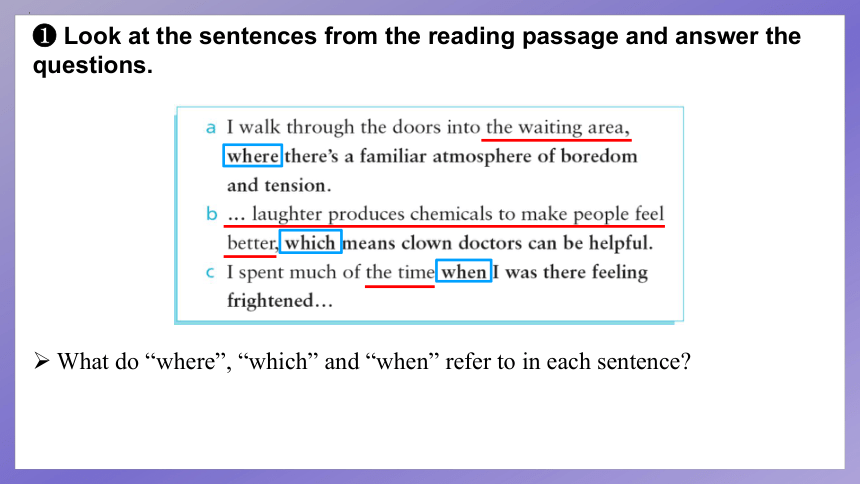
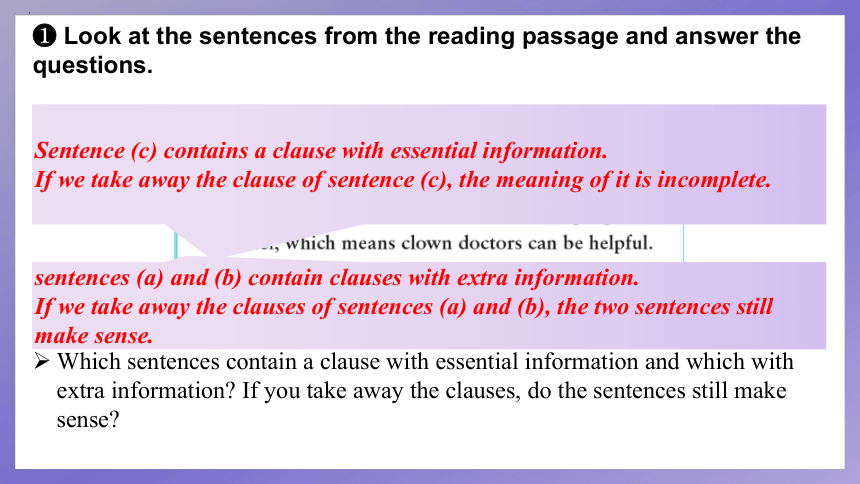
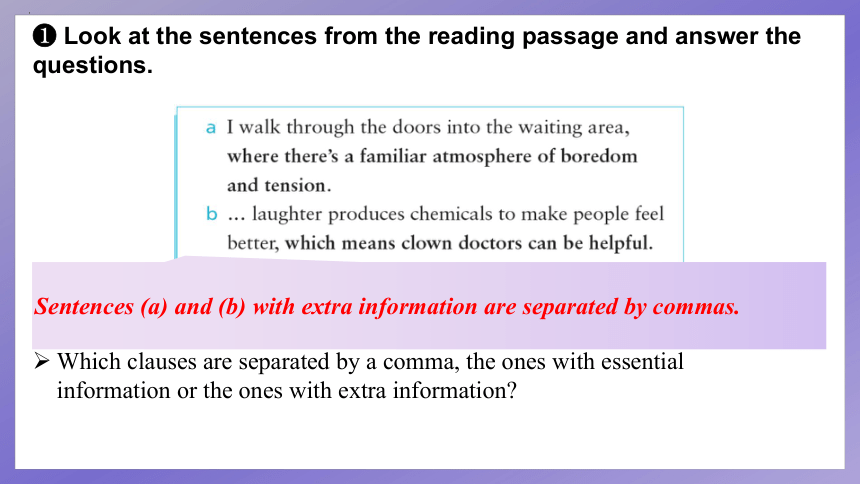
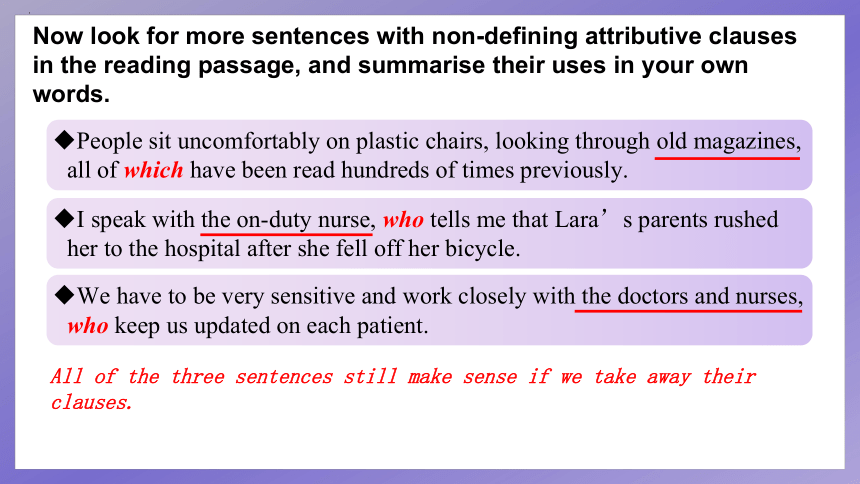
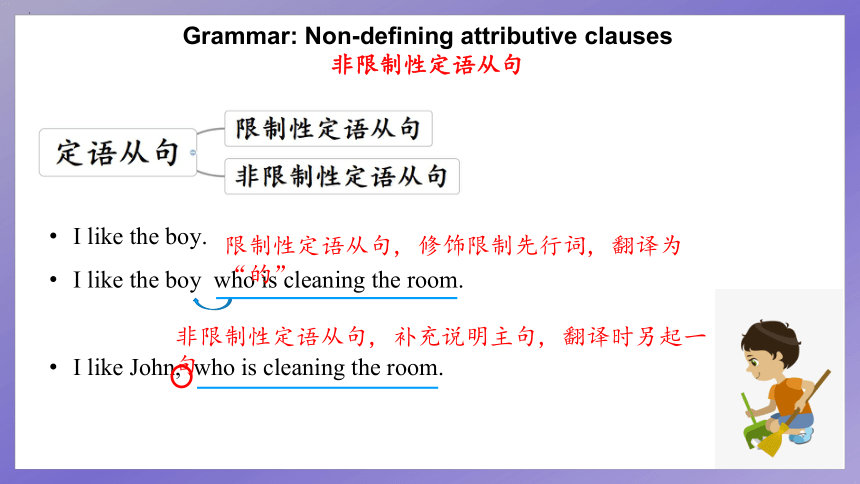
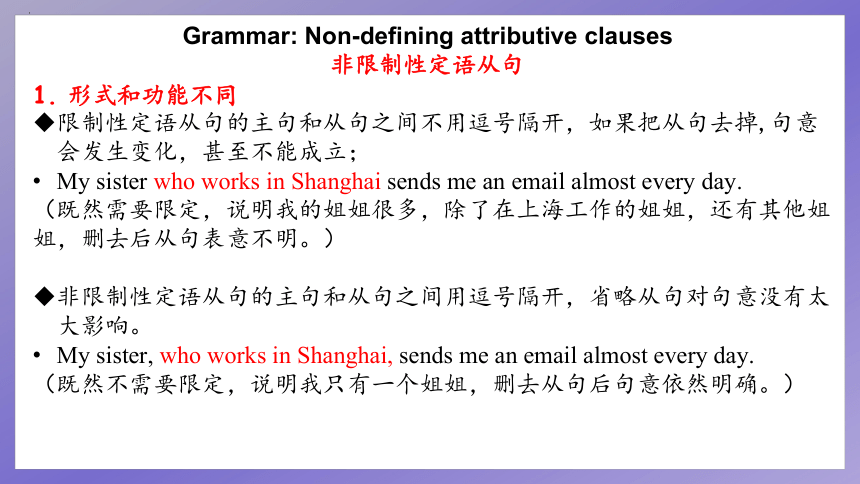
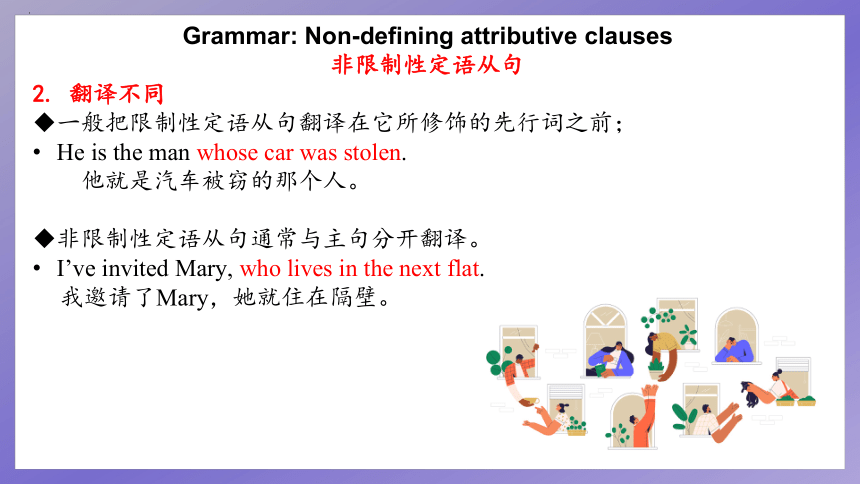
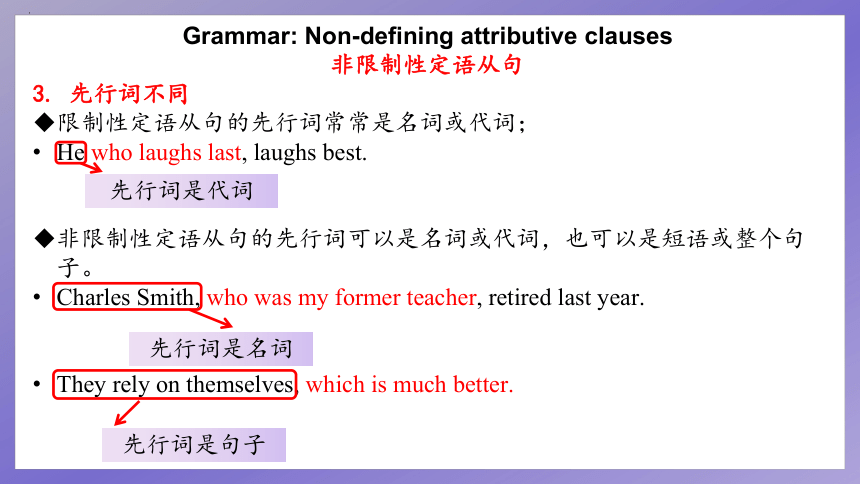
文档简介
(共29张PPT)
Unit 1
Laugh out loud!
BY MICHELLE
Using language
Non-defining attributive clauses
Look at the sentences from the reading passage and answer the questions.
What do “where”, “which” and “when” refer to in each sentence
Look at the sentences from the reading passage and answer the questions.
Sentence (c) contains a clause with essential information.
If we take away the clause of sentence (c), the meaning of it is incomplete.
sentences (a) and (b) contain clauses with extra information.
If we take away the clauses of sentences (a) and (b), the two sentences still make sense.
Which sentences contain a clause with essential information and which with extra information If you take away the clauses, do the sentences still make sense
Look at the sentences from the reading passage and answer the questions.
Which clauses are separated by a comma, the ones with essential information or the ones with extra information
Sentences (a) and (b) with extra information are separated by commas.
Now look for more sentences with non-defining attributive clauses in the reading passage, and summarise their uses in your own words.
People sit uncomfortably on plastic chairs, looking through old magazines, all of which have been read hundreds of times previously.
I speak with the on-duty nurse, who tells me that Lara’s parents rushed her to the hospital after she fell off her bicycle.
We have to be very sensitive and work closely with the doctors and nurses, who keep us updated on each patient.
All of the three sentences still make sense if we take away their clauses.
Grammar: Non-defining attributive clauses
非限制性定语从句
I like the boy.
I like the boy who is cleaning the room.
I like John, who is cleaning the room.
限制性定语从句, 修饰限制先行词, 翻译为“的”
非限制性定语从句, 补充说明主句, 翻译时另起一句
Grammar: Non-defining attributive clauses
非限制性定语从句
1. 形式和功能不同
限制性定语从句的主句和从句之间不用逗号隔开,如果把从句去掉,句意会发生变化,甚至不能成立;
My sister who works in Shanghai sends me an email almost every day.
(既然需要限定,说明我的姐姐很多,除了在上海工作的姐姐,还有其他姐姐,删去后从句表意不明。)
非限制性定语从句的主句和从句之间用逗号隔开,省略从句对句意没有太大影响。
My sister, who works in Shanghai, sends me an email almost every day.
(既然不需要限定,说明我只有一个姐姐,删去从句后句意依然明确。)
Grammar: Non-defining attributive clauses
非限制性定语从句
2. 翻译不同
一般把限制性定语从句翻译在它所修饰的先行词之前;
He is the man whose car was stolen.
他就是汽车被窃的那个人。
非限制性定语从句通常与主句分开翻译。
I’ve invited Mary, who lives in the next flat.
我邀请了Mary,她就住在隔壁。
Grammar: Non-defining attributive clauses
非限制性定语从句
3. 先行词不同
限制性定语从句的先行词常常是名词或代词;
He who laughs last, laughs best.
非限制性定语从句的先行词可以是名词或代词,也可以是短语或整个句子。
Charles Smith, who was my former teacher, retired last year.
They rely on themselves, which is much better.
先行词是代词
先行词是名词
先行词是句子
限制性定语从句和非限制性定语从句的区别
限制性 非限制性
形式上 不用逗号 用逗号
意义上 去掉后主句意思不完整 去掉后主句意思完整
作用 修饰限制 补充说明
先行词 词(n/pron)/短语 词/短语/整个主句
关系词 关系代词作宾时可省 whom作宾时可用who代 不用that, why引导
所有关系代词均不可省
翻译 先译从句再译先行词, ……的…… 先译先行词后译从句,形成两个分句
指人 指物 所属
限制性 who, whom, that which, that, as whose
非限制性 who, whom which, as whose
关系词
This is the man (whom/who/that) we are talking about.
The young man had a new girlfriend, whom he wanted to impress.
Her father, who has a lot of money, wishes her to study abroad.
非限制性定语从句需要注意的问题
1. 非限制性定语从句常常位于句末,但也可位于句中, 这时前后都需要用逗号隔开。
The children, who wanted to play football, were disappointed when it rained.
那些孩子都想踢足球,(因而)因下雨感到失望。
2.“介词+关系代词”也可以引导非限制性定语从句。
先行词指人时关系代词用whom, 不可用who/that; 先行词指物时, 关系代词用which, 不能用that。
This is the student, for whom I bought a book.
They live in a house, of which the windows are made of glass.
关系词as和which的区别
As everyone knows, China is a country with a long history.
She is a great hero, as is described in the report.
He invited me to dinner, which made me very happy.
This novel, which I have read three times, is very touching.
as和which在引导非限制性定语从句时可代替整个主句。
as和which引导非限制性定语从句时的位置不同: as引导的定语从句可置于___________________,而which引导的非限制性定语从句不可放在_______________________________。
句首、句中、句后
句首,只能放在句中、句后
用适当的关系词填空
1. is known to everybody,the moon travels around the earth once every
month.
2.English is a language shared by several diverse cultures,each of
uses it differently.
3.She gave another piece of advice, I think was of great help to the
research work.
4.She showed the visitors around the museum, construction had
taken more than three years.
5.The number of smokers, is reported,has dropped by 17 percent in just
one year.
As
which
which
whose
as
用适当的介词+关系词填空
1. The factory _________ his father works is faraway from my hometown.
2. In the dark street, there wasn’t a single person_________ she could turn for
help.
3. This is Mr. Smith, _________ factory we work.
4. We stood at the top of the hill, ___________ we can see the town.
to whom
in which
in whose
from where
Read the passage and rewrite the tips using non-defining attributive clauses. Add more tips to the list if you can.
Go for a walk in the countryside, where you can enjoy the beautiful views and a peaceful atmosphere.
Spend time with your family and friends, which will activate chemicals in your brain to make you feel happier.
Try to accept your mistakes, where / through which you can learn a lot.
Close your eyes and picture the future, where you’ve made your dreams come true.
Complete the joke with the sentence parts in the box using who / which and put commas in the correct position.
has lost his patience by now
he thinks will impress Holmes
is lying next to him
he finds annoying
, who is lying next to him
, which he finds annoying
, which he thinks will impress Holmes
, who has lost his patience by now
Think of a joke you find funny and write it down using non-defining attributive clauses where appropriate. Then share your joke
with the class.
One day a hostess planned to entertain a guest to dinner at her home. Unfortunately, she found the cheese running out when preparing an apple pie; as a result, she had to apologise to her guest for serving an apple pie without any cheese. The little boy of the family, who was naughty, left the room quietly and after a moment returned with a piece of cheese, which he put on the guest's plate. The mother was quite content with what he had done. Smiling the guest tasted the cheese as if it were the most delicious food in the world and then said to the little boy, "You must have better eyes than your mother, child, but where did you find the cheese ”“In the mouse trap, sir," whispered the boy.
Fun time!
Listen and complete the conversations.
1. ear to ear
2. head off
3. smiles
4. laughing
5. a smile
Match the expressions you have completed in Activity 5 to their meanings.
laughing stock
grin from ear to ear
be all smiles
crack a smile
laugh one's head off
Now work in groups and think of more expressions about laughter.
burst out laughing 放声大笑
for a laugh/ for laughs 为了取乐,作为消遣
have /get the last laugh 笑到最后,取得最后的胜利
He who laughs last, laughs best. 笑到最后的人笑的最开心。
fall about laughing 忍不住大笑
giggle 咯咯笑,傻笑
laugh foolishly 傻笑
smile bitterly 苦笑
smirk 幸灾乐祸的笑
snicker , laugh one's sleeve 窃笑
tease, make fun of 取笑
wear a big smile on one's face 笑容满面
laugh till the tears roll down one's cheeks /laugh with tears rolling down one's cheeks 笑出眼泪
Work in pairs. Discuss other situations in which you could use these expressions.
Tom must have passed that really hard test.
Why do you think so
Because he was grinning from ear to ear yesterday when I met him.
Story Behind The Celebration
Listen to the radio programme and choose the pictures mentioned.
√
√
√
Listen again and complete the notes.
the "washing of the lions"
18th and 19th centuries
1965
BBC News Channel
smells to be carried
1957
a really good harvest
Discuss which of the practical jokes you think is funny.
Complete the boxes with expressions from the radio programme.
Telling a story Making comments
Let’s start with ...
That’s so funny!
It’s a good one!
Now, my favourite one ...
I can imagine!
I don’t get it.
Work in pairs. Tell each other a funny story and make comments using the expressions in this section.
Think of a joke you find funny and write it down using non-defining attributive clauses where appropriate. Then share your joke with the class.
THANKS FOR WATCHING
Unit 1
Laugh out loud!
BY MICHELLE
Using language
Non-defining attributive clauses
Look at the sentences from the reading passage and answer the questions.
What do “where”, “which” and “when” refer to in each sentence
Look at the sentences from the reading passage and answer the questions.
Sentence (c) contains a clause with essential information.
If we take away the clause of sentence (c), the meaning of it is incomplete.
sentences (a) and (b) contain clauses with extra information.
If we take away the clauses of sentences (a) and (b), the two sentences still make sense.
Which sentences contain a clause with essential information and which with extra information If you take away the clauses, do the sentences still make sense
Look at the sentences from the reading passage and answer the questions.
Which clauses are separated by a comma, the ones with essential information or the ones with extra information
Sentences (a) and (b) with extra information are separated by commas.
Now look for more sentences with non-defining attributive clauses in the reading passage, and summarise their uses in your own words.
People sit uncomfortably on plastic chairs, looking through old magazines, all of which have been read hundreds of times previously.
I speak with the on-duty nurse, who tells me that Lara’s parents rushed her to the hospital after she fell off her bicycle.
We have to be very sensitive and work closely with the doctors and nurses, who keep us updated on each patient.
All of the three sentences still make sense if we take away their clauses.
Grammar: Non-defining attributive clauses
非限制性定语从句
I like the boy.
I like the boy who is cleaning the room.
I like John, who is cleaning the room.
限制性定语从句, 修饰限制先行词, 翻译为“的”
非限制性定语从句, 补充说明主句, 翻译时另起一句
Grammar: Non-defining attributive clauses
非限制性定语从句
1. 形式和功能不同
限制性定语从句的主句和从句之间不用逗号隔开,如果把从句去掉,句意会发生变化,甚至不能成立;
My sister who works in Shanghai sends me an email almost every day.
(既然需要限定,说明我的姐姐很多,除了在上海工作的姐姐,还有其他姐姐,删去后从句表意不明。)
非限制性定语从句的主句和从句之间用逗号隔开,省略从句对句意没有太大影响。
My sister, who works in Shanghai, sends me an email almost every day.
(既然不需要限定,说明我只有一个姐姐,删去从句后句意依然明确。)
Grammar: Non-defining attributive clauses
非限制性定语从句
2. 翻译不同
一般把限制性定语从句翻译在它所修饰的先行词之前;
He is the man whose car was stolen.
他就是汽车被窃的那个人。
非限制性定语从句通常与主句分开翻译。
I’ve invited Mary, who lives in the next flat.
我邀请了Mary,她就住在隔壁。
Grammar: Non-defining attributive clauses
非限制性定语从句
3. 先行词不同
限制性定语从句的先行词常常是名词或代词;
He who laughs last, laughs best.
非限制性定语从句的先行词可以是名词或代词,也可以是短语或整个句子。
Charles Smith, who was my former teacher, retired last year.
They rely on themselves, which is much better.
先行词是代词
先行词是名词
先行词是句子
限制性定语从句和非限制性定语从句的区别
限制性 非限制性
形式上 不用逗号 用逗号
意义上 去掉后主句意思不完整 去掉后主句意思完整
作用 修饰限制 补充说明
先行词 词(n/pron)/短语 词/短语/整个主句
关系词 关系代词作宾时可省 whom作宾时可用who代 不用that, why引导
所有关系代词均不可省
翻译 先译从句再译先行词, ……的…… 先译先行词后译从句,形成两个分句
指人 指物 所属
限制性 who, whom, that which, that, as whose
非限制性 who, whom which, as whose
关系词
This is the man (whom/who/that) we are talking about.
The young man had a new girlfriend, whom he wanted to impress.
Her father, who has a lot of money, wishes her to study abroad.
非限制性定语从句需要注意的问题
1. 非限制性定语从句常常位于句末,但也可位于句中, 这时前后都需要用逗号隔开。
The children, who wanted to play football, were disappointed when it rained.
那些孩子都想踢足球,(因而)因下雨感到失望。
2.“介词+关系代词”也可以引导非限制性定语从句。
先行词指人时关系代词用whom, 不可用who/that; 先行词指物时, 关系代词用which, 不能用that。
This is the student, for whom I bought a book.
They live in a house, of which the windows are made of glass.
关系词as和which的区别
As everyone knows, China is a country with a long history.
She is a great hero, as is described in the report.
He invited me to dinner, which made me very happy.
This novel, which I have read three times, is very touching.
as和which在引导非限制性定语从句时可代替整个主句。
as和which引导非限制性定语从句时的位置不同: as引导的定语从句可置于___________________,而which引导的非限制性定语从句不可放在_______________________________。
句首、句中、句后
句首,只能放在句中、句后
用适当的关系词填空
1. is known to everybody,the moon travels around the earth once every
month.
2.English is a language shared by several diverse cultures,each of
uses it differently.
3.She gave another piece of advice, I think was of great help to the
research work.
4.She showed the visitors around the museum, construction had
taken more than three years.
5.The number of smokers, is reported,has dropped by 17 percent in just
one year.
As
which
which
whose
as
用适当的介词+关系词填空
1. The factory _________ his father works is faraway from my hometown.
2. In the dark street, there wasn’t a single person_________ she could turn for
help.
3. This is Mr. Smith, _________ factory we work.
4. We stood at the top of the hill, ___________ we can see the town.
to whom
in which
in whose
from where
Read the passage and rewrite the tips using non-defining attributive clauses. Add more tips to the list if you can.
Go for a walk in the countryside, where you can enjoy the beautiful views and a peaceful atmosphere.
Spend time with your family and friends, which will activate chemicals in your brain to make you feel happier.
Try to accept your mistakes, where / through which you can learn a lot.
Close your eyes and picture the future, where you’ve made your dreams come true.
Complete the joke with the sentence parts in the box using who / which and put commas in the correct position.
has lost his patience by now
he thinks will impress Holmes
is lying next to him
he finds annoying
, who is lying next to him
, which he finds annoying
, which he thinks will impress Holmes
, who has lost his patience by now
Think of a joke you find funny and write it down using non-defining attributive clauses where appropriate. Then share your joke
with the class.
One day a hostess planned to entertain a guest to dinner at her home. Unfortunately, she found the cheese running out when preparing an apple pie; as a result, she had to apologise to her guest for serving an apple pie without any cheese. The little boy of the family, who was naughty, left the room quietly and after a moment returned with a piece of cheese, which he put on the guest's plate. The mother was quite content with what he had done. Smiling the guest tasted the cheese as if it were the most delicious food in the world and then said to the little boy, "You must have better eyes than your mother, child, but where did you find the cheese ”“In the mouse trap, sir," whispered the boy.
Fun time!
Listen and complete the conversations.
1. ear to ear
2. head off
3. smiles
4. laughing
5. a smile
Match the expressions you have completed in Activity 5 to their meanings.
laughing stock
grin from ear to ear
be all smiles
crack a smile
laugh one's head off
Now work in groups and think of more expressions about laughter.
burst out laughing 放声大笑
for a laugh/ for laughs 为了取乐,作为消遣
have /get the last laugh 笑到最后,取得最后的胜利
He who laughs last, laughs best. 笑到最后的人笑的最开心。
fall about laughing 忍不住大笑
giggle 咯咯笑,傻笑
laugh foolishly 傻笑
smile bitterly 苦笑
smirk 幸灾乐祸的笑
snicker , laugh one's sleeve 窃笑
tease, make fun of 取笑
wear a big smile on one's face 笑容满面
laugh till the tears roll down one's cheeks /laugh with tears rolling down one's cheeks 笑出眼泪
Work in pairs. Discuss other situations in which you could use these expressions.
Tom must have passed that really hard test.
Why do you think so
Because he was grinning from ear to ear yesterday when I met him.
Story Behind The Celebration
Listen to the radio programme and choose the pictures mentioned.
√
√
√
Listen again and complete the notes.
the "washing of the lions"
18th and 19th centuries
1965
BBC News Channel
smells to be carried
1957
a really good harvest
Discuss which of the practical jokes you think is funny.
Complete the boxes with expressions from the radio programme.
Telling a story Making comments
Let’s start with ...
That’s so funny!
It’s a good one!
Now, my favourite one ...
I can imagine!
I don’t get it.
Work in pairs. Tell each other a funny story and make comments using the expressions in this section.
Think of a joke you find funny and write it down using non-defining attributive clauses where appropriate. Then share your joke with the class.
THANKS FOR WATCHING
